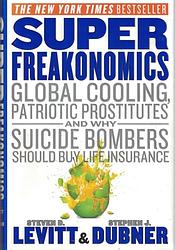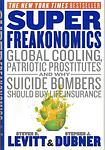Super Freakonomics by Steven D. Levitt, Stephen J. Dubner
This book delves into the counterintuitive aspects of economics, applying economic theory to a wide range of unusual and everyday topics to explore hidden aspects of the world. Through engaging narratives and data analysis, it challenges conventional wisdom and uncovers surprising insights into human behavior, crime rates, high-stakes financial decisions, and more. The authors use a blend of storytelling and rigorous research to question the obvious and reveal the unseen forces shaping our lives, demonstrating how economic principles can illuminate complex and seemingly unrelated phenomena.
The 9107th greatest book of all time
Ranking Details:
Our ranking system awards points to books based on their appearance and position on curated lists. Here's how it works:
Unranked Lists: For lists without specific rankings, each book receives points equivalent to the list's weight. This approach recognizes the book's inclusion on prestigious lists.
Ranked Lists: Books on ranked lists receive points in two ways:
- Base Points: Initially, every book is awarded points equal to the list's weight, acknowledging its significance.
- Bonus Points: Additionally, books earn bonus points based on their ranking. The total bonus pool, equal to 100% of the list's weight, is distributed among the books, with higher-ranked books receiving more points.
Exponential Distribution: The distribution of bonus points follows an exponential model. This means the top-ranked book (#1) receives significantly more bonus points than those further down the list (e.g., #100). Our algorithm ensures that higher placements are rewarded more generously, reflecting the achievement of a top rank on any given list.
This scoring system ensures that each book's ranking reflects both its presence on multiple lists and its positions within those lists, providing a comprehensive measure of its acclaim and popularity.
Total Points: 69
Since this book was first published in 2009, there is a penalty of 56.0%. The age adjusted score is 30.36.
This is to prevent newer books from reaching super high on the ranked list of the greatest books of all time. The greatest books should also stand the test of time.
- score: 69 -- Bill Gate's Book Recommendations (Weight: 69)

